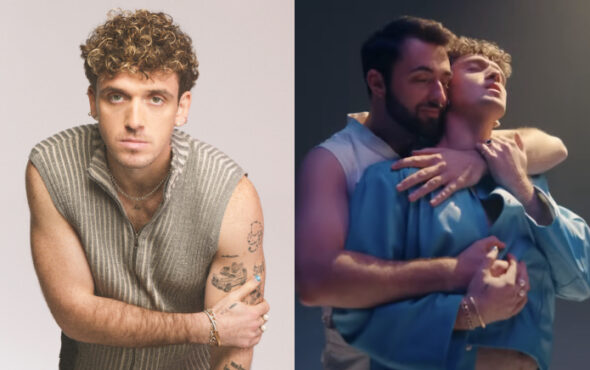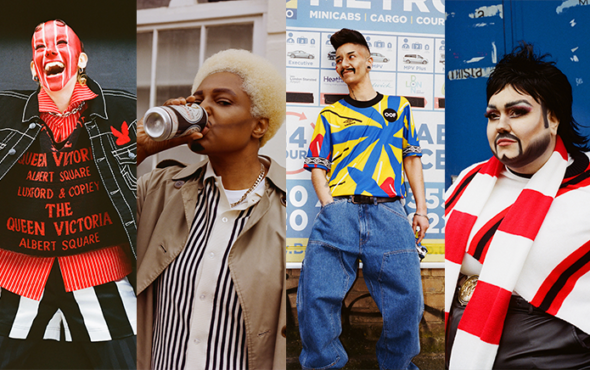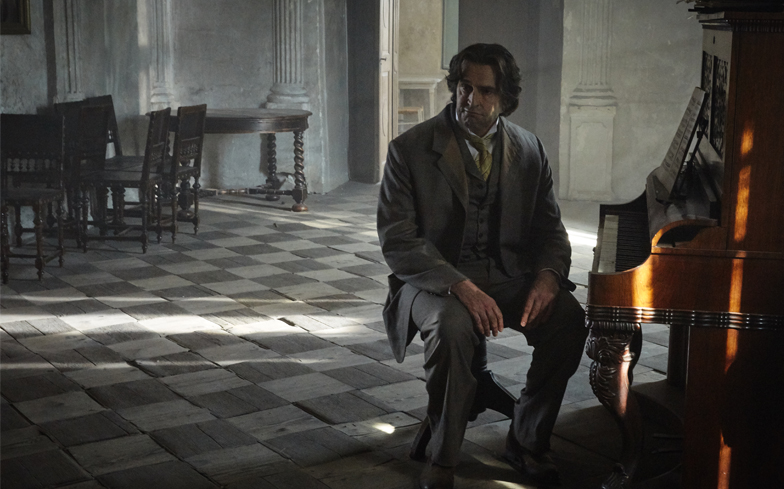
The Happy Prince is the untold story of the final days of Oscar Wilde’s tragic life.
Written and directed by Rupert Everett, who also takes on the role of Wilde, it takes a no holds barred look at the grim reality of the author following his imprisonment for gross indecency with men.
Caught between his lust for Lord Alfred Douglas (Bosie) and the long-time love from his friend Robbie Ross, the iconic writer spent his final hours observing the failures and difficulties of his life.
“It’s almost as though the world is too embarrassed to think about how it treated this person,” Everett tells Gay Times. “What the world did to him was not just a prison sentence, but there was a punishment afterwards as well.”
The British actor also opens up about his affinity with Oscar Wilde’s story having spent years as an openly gay man in Hollywood, how the sexual revolution hasn’t done us any favours when it comes to relationships, and how the LGBTQ community can take so much strength from our history.
What is it about Oscar Wilde that really made you to want to tell this story for a mainstream audience?
If one’s thinking of doing one thing ever, and trying to make some sense of everything to yourself and in one sense for me and my own career and being gay in the business, this just seemed like the obvious story to try and tell. To me, Wilde is a kind of patron saint of me in particular, because what I find very appealing about him is what an idiot he is. What a mess he made of everything. I find that – because when you look back on your own life at what you’ve done yourself that is catastrophic mis-management – one gives oneself a hard time for all those mistakes you made. I think the notion of something like Christ, which is supposed to be half god half man is always under baked in Christianity, because the real thing of that is there being a genius half and then being very human on the other side, making human mistakes, and having all the human traits we all have which is greed, snobbery, and envy.
Wilde has all of that and so there’s something even more touching about the whole of his story. Even his hopeless imprisonment came from his own ego really. If he hadn’t taken the father of his lover to court – the father of his lover posted him a card saying ‘You’re posing as being a gay’ – he could have torn that up if he’d been sensible. He was a practicing gay at the time, but denied himself and pretended he wasn’t and sued that guy for libel. But it all came back at him. Even that I find so touching. You can see how you would perhaps do the same thing. Everything about him – all his actions – I find very moving, and very applicable to myself. I’m not saying I’ve been crucified like Wilde was, but I think anybody who has tried to achieve a life in showbusiness – which is an aggressively heterosexual business as a gay person, a lesbian, or god forbid a transgender person – Wilde is always an inspiration.
What kind of research did you do to get the characterisation of Oscar Wilde perfect for this project?
I’ve had quite a lot of practice in a way, because first of all I had been in two or three Wilde plays over the years. One of the parts I played was a guy called Lord Henry Wotton, who is very loosely based on Wilde himself. Then I had been in The Importance of Being Earnest in France. So little by little I was getting very familiar with the vernacular and the words of his – how he thought and how he spoke. I suppose just reading about him, researching, and imagining it really.
But also reacting to the other films in a way – all three of which I love. History is what we want it to be in a way, and I wanted him to be different to them. They were made at different times when perhaps you couldn’t be quite so flesh and blood-ish with a gay character, you had to be slightly more reverential. All of them flinch at telling the whole story. It’s almost as though the world is too embarrassed to think about how it treated this person. What the world did to him was not just a prison sentence, but there was a punishment afterwards as well. So it felt like a great story to try and tell, and to feel it.
The thing I was most surprised about in the movie was Wilde’s substance abuse.
The thing about that is, Queen Victoria was a junkie! If you look at the pharmacy bills at Balmoral, they’re all her having morphine or laudanum. Cocaine, for example, you’d have for a sore throat. You’d have coke and water for a cold! So it’s very weird to think of those people – and anyone with any money – would be quite up and down in ways we now consider, ‘Oh, he’s on something.’ They were as well. It’s weird.
Why do you think Oscar Wilde was so self destructive?
That’s another thing I think is very interesting about him. Self-destruction: why is it that everyone has it? It’s such a weird human trait. What he hadn’t got were parameters over which he wouldn’t go. Most of us do have self destruction in us but we normally pull ourselves back. But what is weird is, why do we have this instinct to throw ourselves over cliffs? I think everyone has it. What he did, he didn’t have the brake pads to stop it. In other words, he drove it right on through. I know people who are still like that – they go non-stop into destruction.
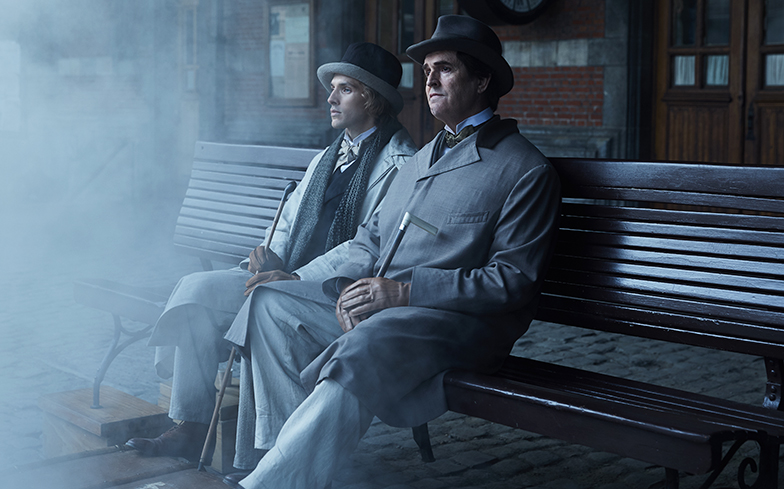
In the movie, it felt like Robbie Ross would have been better for Oscar as a partner than Bosie – how did you come to that conclusion when writing the script?
It was one of the initial things I really felt. I wanted to investigate what love really is. For all of us, particularly me, all through my life I’ve fallen in love with face value, or people with nice bodies, or looked great, and then had to unravel the person afterwards. That’s kind of what Wilde did with Bosie. The real love was always sitting there waiting for him to see it, but he didn’t see it. That’s another thing that happens to a lot of us. I don’t know why, but we’ve got such a weird notion of what love is, or what a relationship is. In one sense, the revolution of sex has not done us any favours because all of us would probably say, ‘Oh it’s got to work sexually before anything else.’ But it kind of stops one being able to look at just what love is. What Robbie felt for Wilde was love. He loved him unconditionally, and Wilde had that in front of him all the way through, but was such a snob.
Was there anything about Oscar Wilde you learned during this experience that surprised you?
One thing that did always surprise me was that when he was tried, he was tried in court with the guy who ran the brothel in Chelsea. He was this very nice guy who had this first floor flat in a house and would have stable hands and soldiers over, and they’d all meet rich people. It’s sounds amazing. They would stage gay marriages and things like that. He was busted at the same time as Wilde and they were tried together. He was given the opportunity to receive immunity if he turned on Wilde, but he turned it down because he was honourable.
But never ever have I read a word from Oscar Wilde or any of the others to say anything about this. To say where he was or what happened to him. He was then found about 40 years later in 1938. Bosie was in New York and he was at the Waldorf Astoria and he called for room service, and that guy brought it up. But he wasn’t mentioned before, or after. I was surprised by that because you’d think if it was you or me and someone had taken the bullet for you, you’d be in contact with them for the rest of your life somehow.
Do you think enough people know the history of not only Oscar Wilde, but notable LGBTQ figures from our history in general?
I think our problem in the modern world is history. History really helps us because it puts us into such a perspective. The virtual world seems to me to have made history even shorter. In other words, now two years is ancient history. But I think for us in the LGBTQ community, there’s so much strength to be taken from our history because we’ve come such a long way – particularly in this country. There are a few exceptions where some terrible things have happened, but we’ve come an enormous distance since that time. We’ve changed the perception around us, even after AIDS which really threw things backwards at first. We have so much opportunity now that we never had before.
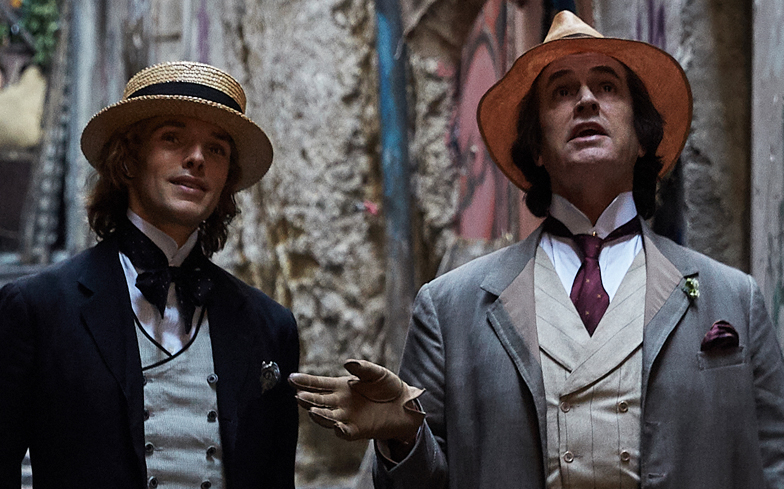
If we were more aware of this, I think we’d be feeling better rather than hemmed in. Quite a lot of the world now feels very aggressive about wanting change, and angry and bitter, but if they looked at it more in an historical context, they’d say, ‘Woof, still in the last 100 years, 50 years, 25 years, there’s been so much movement in all these areas.’ Even if you look at the women’s movement in the 2 million-year history of mankind, in the last millisecond everything has changed. Of course there are still chapters to be written for all of us in a new constitution, but I feel knowing more history and knowing that that history is you, it gives you a confidence in some way. It’s a shame we don’t look at more of our historical characters.
Would you agree that if LGBTQ history was included in the school syllabus it would be useful for wider society to understand the struggle more?
I agree. I think it would be useful too. I also think it was a shame, for example, when they did the Alan Turing film, that they really kind of almost made him out to be straight in it.
There needs to be more responsibility to present the real human behind the story.
Yeah, it needs to be more real. There are so many fantastic stories around.
With that in mind, are there any other historical LGBTQ figures you’d like to portray on the big screen – either as an actor, writer or director?
With what I’m trying to do next, there isn’t. But there are tonnes. I don’t know who I’d like to make a movie about. The end of the life of Lord Byron would be a great thing, because he fell really in love with this boy who was horrible to him. I think a TV series about Lord Byron would be amazing. I’ve written a script about a coming-of-age story of a boy going out on an exchange trip to France and getting into that whole gay community of Yves Saint Laurent, Rudolph Nureyev, and Karl Lagerfeld. But there are tonnes of gay stories that should be done.
GLAAD reported a decrease in LGBTQ representation in movies released by major studios last year – why do you think that is?
People have to keep working at it. Maybe we should start a movement, because definitely we’re the group now that hasn’t made too much of a fuss about things. In terms of prejudice basically. Things are changing but still they’re not changing that much. I’m surprised by that statistic, because it seemed to me that there were a lot more. We just have to keep working and coming up with great movies.
The Happy Prince will be in UK cinemas from 15 June, and will be released in the US on 5 October.


